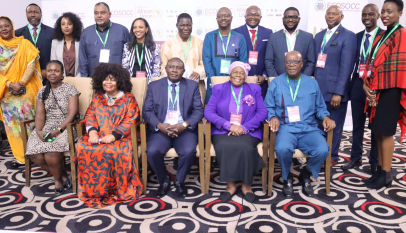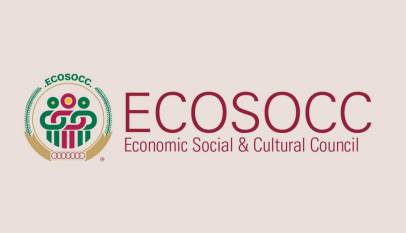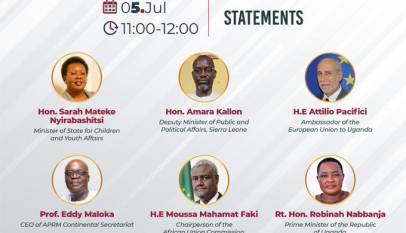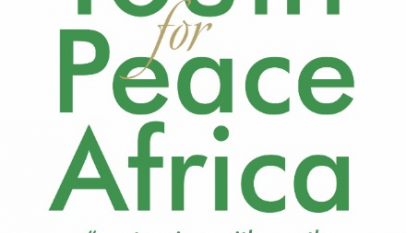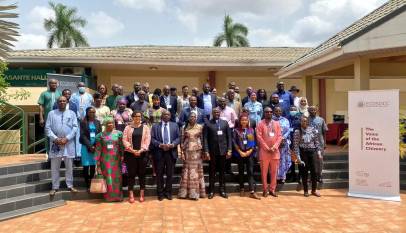AU ECOSOCC’s teleconference highlights youths’ strategic position in post-pandemic Africa
The African Union Economic, Social, and Cultural Council (AU ECOSOCC) and the African Development Bank (AfDB), Thursday, hosted a teleconference on the theme: “Role of Youth in Shaping a Post-Pandemic Africa,” focused on how African youths can contribute in shaping the continent`s future – post-pandemic.
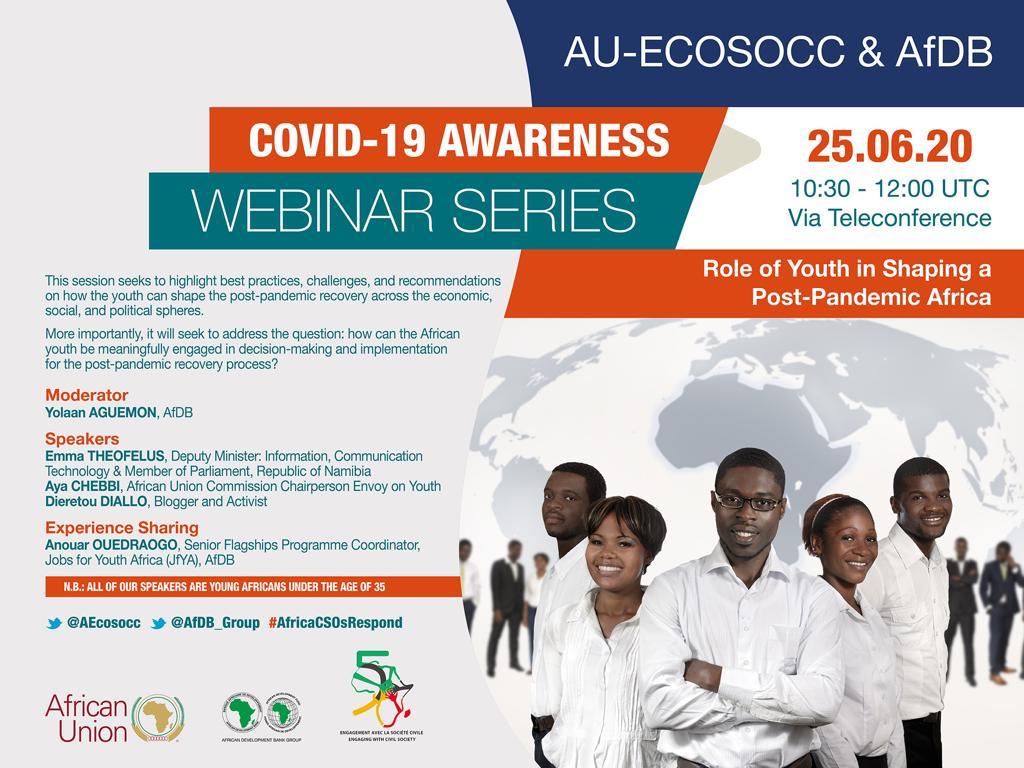
It was against the unsettling backdrop of the COVID-19 pandemic in Africa that AU ECOSOCC and AfDB’s Gender, Women and Civil Society Department, in March, launched a webinar series focused on raising awareness, sensitizing and educating African citizens about the coronavirus pandemic and its associated public health consequences.
Previous editions of the webinars had focused on a wide-range of topics around the COVID-19 response namely, water and sanitation, misinformation, resource mobilization, and gender mainstreaming, amongst others. The webinars provide a platform for the sharing of lessons from the interventions that African Civil Society Organizations (CSOs) are undertaking at national and subnational levels in response to the pandemic.
According to the United Nations, Africa is the fastest-growing and most youthful continent in the world, with over 65% of the continent’s over 1.2 billion people being below the age of 35; nearly 50% of which are said to be under the age of 19. Moreover, youths account for 60% of the total unemployed in Africa, in the absence of social safety nets and adequate economic stimulus packages from governments across continent, many more have lost their jobs and sources of livelihood to the pandemic.
It was on this premise that the last edition of the AU ECOSOCC-AfDB webinar series, themed: “The Role of Youth in Shaping a Post-Pandemic Africa,” examined some of the unprecedented challenges currently facing the continent’s young people – most of which had been exacerbated by the fallout of the coronavirus pandemic, including how African youths could be meaningfully engaged in shaping the continent’s post-pandemic future.
While speaking at the teleconference, Namibia’s Deputy ICT Minister Emma Theofelus, observed that, even prior to the pandemic, job security was already the biggest challenge for most youths in Africa, adding that, with the outbreak of the pandemic, small businesses, which were largely owned by young people had been badly affected by the lockdowns imposed by governments.
In addition, Theofelus expressed her displeasure at the fact that many businesses had to shut down simply because they couldn`t migrate to the online space. She therefore said it was high time that young Africans adapt the model of their businesses to digital platforms. “We need to adjust our living conditions and realities to mitigate the existing challenges we are facing and find new ways to accelerate these solutions to better prepare ourselves for similar situations in the future,” said Theofelus.
In her address at the webinar, Aya Chebbi, the AU`s youth envoy, said the pandemic had had an unprecedented impact on education since most African youths lacked access to e-learning tools. “African youths who are living in rural settlements are lacking information due to the digital divide. And 51% of Africans don’t have access to electricity or reliable source of energy. Without energy; there will be no digitalization; and without digitalization there will be less job opportunities because that is the ‘new normal’,” said Chebbi.
Even so, Chebbi said African youths were innovative thus could play a central role in shaping the continent`s post-pandemic future. Consequently, she urged for youth inclusion in decision-making processes, adding that her office had been playing a critical role in bringing the voices of young people to the forefront of the AU’s fight against the pandemic, through series of virtual consultations between youths and over 400 leaders from across Africa. “We pioneered series of webinars where [AU Commission] commissioners and RECs leaders engaged with youths. During these consultations, youths expressed two major concerns: job and food security.”
Anouar Ouedraogo, senior flagships platform coordinator of AfDB’s Jobs for Youth Africa (JfYA) strategy, while explaining the JfYA strategy which was adopted in 2016 to webinar participants, said its objective was to create 25 million jobs and equip 50 million African youth with capacity building skills so as to ameliorate their conditions, adding that the JfYA was based on three pillars namely, integration, innovation, industrialization.
“Regarding integration, we need to show example by integrating employment with investment; the Bank has invested 10 billion US dollars on the continent. We have estimated that these investments could create different jobs for our youths, we are asking project coordinators at the Bank to integrate youths in the workplace, when they do project consultancies.
“The second pillar is innovation. We have developed flagship programmes across three sectors. I will start with agriculture, agriculture can create the most jobs with a contribution of up to 35% to the GDP. Our premium programme in agriculture is meant to support rural economies. For those who have not been to school or left very early and lack competencies for formal jobs, we have launched micro-finance schemes at rural level. Second is agro-industry, it is meant for those who have intermediate competency and have gone to secondary school, we will provide them with education to enter the agro-industry.
“The third programme we have is meant to support youth graduates, by equipping them with the right information to come back to agriculture and adapt it as a business and create value. We can help them conduct market study, understand the market and develop business enterprises in the agriculture industry. Regarding industrialization, we have programs tailored for special economic zones, we are now developing agro-huts,” narrated Ouedraogo.
While sharing her experience, Dieretou Diallo, a youth influencer and activist, agreed with Chebbi that African youths would be key in shaping a positive future for the continent, post-pandemic. Hence, Diallo challenged young Africans to support the ‘youth agenda’ by joining the fight against COVID-19.
“Our countries are different, in Guinea, for example, we find it difficult to find youths with the required skillset and competencies. With a population of just 12 million people, we are lacking qualified people with the necessary skillsets, therefore, our educational system is not meeting the needs of our country, but we can try to fill this gap by doubling our efforts. We can collaborate not only with Guineans but with the African diaspora,” Diallo said.
In his concluding remarks, the Head of AU-ECOSSOCC Secretariat William Carew, said Africa’s future lies in the hands of its humungous youth population, hence the need to invest in the development of African youths so as to equip them with the requisite skills to contribute to the continent’s development.
“Looking at such a large population of young people, supportive policies and programs on inclusive youth development are critical because clearly, Africa’s future lies in the hands of the youths. And especially now that the continent is grappling with the outbreak and effects of COVID-19. We will serve our continent better by equipping our youth with the required skills, experience and political support so they can carry forward the development agenda of the continent,” noted Carew.


